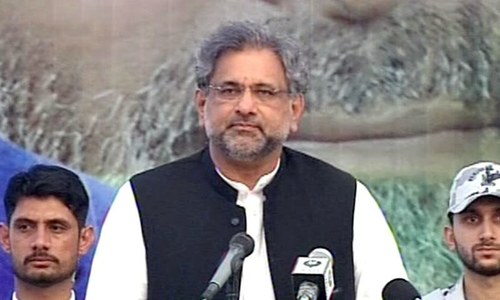FINALLY, a political leader has taken action, going beyond the condemnations and lamentations of the political system that have become so common.
In an extraordinary news conference in Islamabad on Wednesday, PTI supremo Imran Khan named members of his own party in the KP Assembly who allegedly sold their votes in the recent Senate elections.
Twenty PTI MPAs from KP were named by Mr Khan, who claimed that internal party action will be initiated against the accused legislators before evidence is turned over to the National Accountability Bureau.
Also read: Senate election and horse-trading
Mr Khan’s unprecedented attempt to tackle corruption in the electoral process deserves praise. While corruption is endemic and will not be easily defeated, a national political leader trying to lead by example must be acknowledged and should be welcomed.
To be sure, a news conference and verbal allegations do not constitute proof and the accused MPAs are entitled to due process and their rights under the law. Mr Khan has suggested that corruption was unearthed by monitoring the voting process in the KP Assembly.
The single transferable vote is a complex voting system and can yield patterns, but it must be remembered that the ballot is secret and suspicion does not equal proof.
Moreover, a system that effectively allows the party chief to decide who the party’s Senate candidates are and requires MPAs to vote as ordered is itself a flawed process.
It is possible — though much should not be made of this point — that some MPAs voted according to their conscience or for reasons other than personal gain.
Nevertheless, all political parties have at some point alleged corrupt voting practices in the Senate elections. The allegations reached a crescendo in the elections held last month, but it does appear that vote-buying is a long-standing practice that needs to be exposed and eradicated. Mr Khan has set a welcome democratic precedent.
To cleanse the Senate voting process of corruption and fraud, significant changes will be needed. To begin with, parties must acknowledge both losses and gains in alleged corrupt practices.
In KP, the PTI missed out on Senate seats it expected to win; in Punjab, the party gained a seat in controversial circumstances.
Chaudhry Mohammad Sarwar, a former ally of the PML-N turned bitter foe and frontline PTI member, has claimed that his victory in Punjab, despite the PTI having less than the required number of MPAs in the province to guarantee a Senate seat, was a triumph of fair politics.
The PML-N has predictably claimed the opposite. Surely, the PTI cannot only see corruption when it loses and fair play when it wins?
The broader question of Senate reforms must be addressed too. Whether the Senate should be directly elected or the secret ballot abolished can be debated by parliament.
What is clear is that the current system is eroding confidence in the democratic project.
Published in Dawn, April 20th, 2018













































